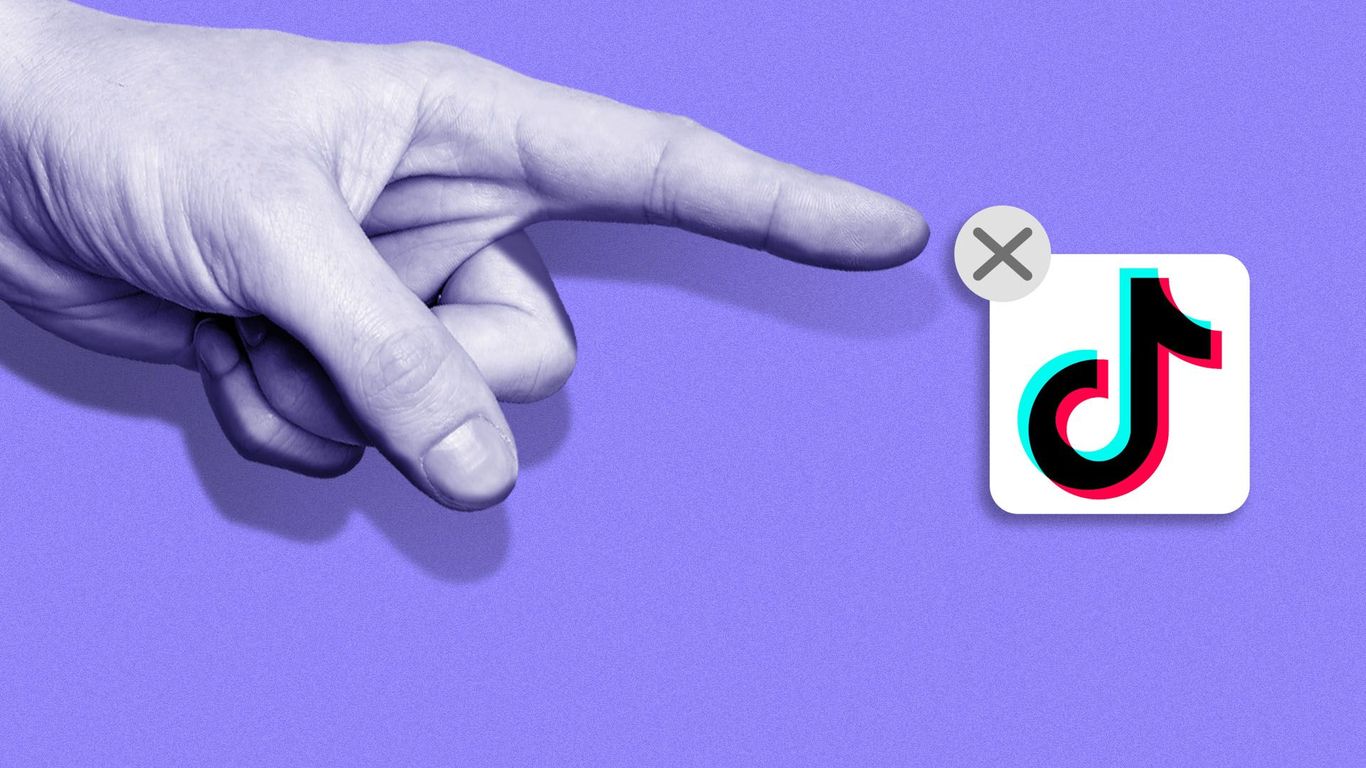SOCIAL
TikTok’s popularity complicates possible U.S. ban

The U.S. government’s threat to ban TikTok takes aim at what has become the most popular smartphone app in the country.
Why it matters: TikTok’s scale presents an enormous challenge to lawmakers trying to argue that the app’s national security threat outweighs the wishes of the millions of people and businesses that use the app.
- The TikTok app has been downloaded more times in the U.S. than any other social app since it merged with U.S. lip-syncing app Musical.ly in August 2018, according to data from Apptopia.
- The app is expected to generate more than $11 billion in U.S. ad revenue by 2024, far outpacing rivals like Snapchat, Pinterest and Twitter, per eMarketer.
- TikTok has also captured far more revenue than its competitors from in-app purchases, like coins that fans can use to tip their favorite creators, per Apptopia.
Driving the news: TikTok CEO Shou Zi Chew plans to highlight the app’s growth in remarks prepared for his first-ever Congressional testimony on Thursday and released Tuesday night by the House committee he will address.
- The company now counts more than 150 million monthly active users in the U.S., up from the 100 million users it first reported in 2020, executives confirmed to Axios.
- Chew will also likely cite TikTok’s role in supporting small businesses — a message that’s also been used by tech rivals like Meta and Google when faced with regulatory pressure.
- On Tuesday, Chew posted a TikTok video touting the app’s reach, asserting that 5 million U.S. businesses, a majority of which are small or medium-sized, use TikTok to reach their customers.
Be smart: Tuesday’s video is part of a broader consumer campaign that the short-video platform is beginning to push amid growing efforts by federal and state governments to limit or ban the app.
- Last week, The Information reported that TikTok sent a message to some creators inviting them to join its top executives in Washington D.C. to support the company on Capitol Hill.
- This week, TikTok is trying to appeal to users directly in the app. “Some politicians have started to talk about banning TikTok,” Chew said in the video posted Tuesday. “Now this could take TikTok away from all 150 million of you.”
- He then directed users to leave comments about “what you want your elected representatives to know about what you love about TikTok.”
Between the lines: TikTok has ramped up its marketing efforts in recent weeks, buying prominent ad space alongside many of D.C.’s most prominent political publications.
- While most of TikTok’s consumer messaging is focused on the ban risk facing the app, its Washington campaign has mostly focused on steps the company is taking to protect U.S. user data.
The big picture: Surveys indicate that the public remains mostly divided on whether the government should ban TikTok, but Republicans are much more likely to support a ban than Democrats.
- Lawmakers that oppose the ban argue the government needs to find more convincing proof that TikTok is a national security threat before forcing the app’s Chinese parent ByteDance to sell to a U.S. company or face a ban.
- Lawmakers that support moves against TikTok say the app is a threat to U.S. user data privacy because of Chinese laws that require Chinese companies to share user data with China’s government.
Yes, but: Many lawmakers fall somewhat in the middle, arguing that lawmakers need to provide the public with more clarity about the actual national security risks.
- “If you’re going to pull the plug on one of the largest digital communities in the country, you have to make a very clear case for why you’re doing that,” Rep. Jeff Jackson (D-N.C.), an avid TikTok user, told Bloomberg.
What to watch: TikTok’s U.S. tech rivals have been waiting in the wings, hoping their TikTok clones — like Reels on both Facebook and Instagram, YouTube Shorts, and Snapchat’s Spotlight — could steal some market share from TikTok if it were banned.
- Those services have all launched in the wake of former president Trump’s initial proposal to ban TikTok in 2020, and many have grown pretty sizable.
- Google said last month that YouTube Shorts has crossed 50 billion daily views.
- Meta CEO Mark Zuckerberg said last month that Reels plays across Facebook and Instagram “have more than doubled over the last year,” and people sharing Reels “has more than doubled on both apps in just the last 6 months.”
SOCIAL
Snapchat Explores New Messaging Retention Feature: A Game-Changer or Risky Move?

In a recent announcement, Snapchat revealed a groundbreaking update that challenges its traditional design ethos. The platform is experimenting with an option that allows users to defy the 24-hour auto-delete rule, a feature synonymous with Snapchat’s ephemeral messaging model.
The proposed change aims to introduce a “Never delete” option in messaging retention settings, aligning Snapchat more closely with conventional messaging apps. While this move may blur Snapchat’s distinctive selling point, Snap appears convinced of its necessity.
According to Snap, the decision stems from user feedback and a commitment to innovation based on user needs. The company aims to provide greater flexibility and control over conversations, catering to the preferences of its community.
Currently undergoing trials in select markets, the new feature empowers users to adjust retention settings on a conversation-by-conversation basis. Flexibility remains paramount, with participants able to modify settings within chats and receive in-chat notifications to ensure transparency.
Snapchat underscores that the default auto-delete feature will persist, reinforcing its design philosophy centered on ephemerality. However, with the app gaining traction as a primary messaging platform, the option offers users a means to preserve longer chat histories.
The update marks a pivotal moment for Snapchat, renowned for its disappearing message premise, especially popular among younger demographics. Retaining this focus has been pivotal to Snapchat’s identity, but the shift suggests a broader strategy aimed at diversifying its user base.
This strategy may appeal particularly to older demographics, potentially extending Snapchat’s relevance as users age. By emulating features of conventional messaging platforms, Snapchat seeks to enhance its appeal and broaden its reach.
Yet, the introduction of message retention poses questions about Snapchat’s uniqueness. While addressing user demands, the risk of diluting Snapchat’s distinctiveness looms large.
As Snapchat ventures into uncharted territory, the outcome of this experiment remains uncertain. Will message retention propel Snapchat to new heights, or will it compromise the platform’s uniqueness?
Only time will tell.
SOCIAL
Catering to specific audience boosts your business, says accountant turned coach

While it is tempting to try to appeal to a broad audience, the founder of alcohol-free coaching service Just the Tonic, Sandra Parker, believes the best thing you can do for your business is focus on your niche. Here’s how she did just that.
When running a business, reaching out to as many clients as possible can be tempting. But it also risks making your marketing “too generic,” warns Sandra Parker, the founder of Just The Tonic Coaching.
“From the very start of my business, I knew exactly who I could help and who I couldn’t,” Parker told My Biggest Lessons.
Parker struggled with alcohol dependence as a young professional. Today, her business targets high-achieving individuals who face challenges similar to those she had early in her career.
“I understand their frustrations, I understand their fears, and I understand their coping mechanisms and the stories they’re telling themselves,” Parker said. “Because of that, I’m able to market very effectively, to speak in a language that they understand, and am able to reach them.”Â
“I believe that it’s really important that you know exactly who your customer or your client is, and you target them, and you resist the temptation to make your marketing too generic to try and reach everyone,” she explained.
“If you speak specifically to your target clients, you will reach them, and I believe that’s the way that you’re going to be more successful.
Watch the video for more of Sandra Parker’s biggest lessons.
SOCIAL
Instagram Tests Live-Stream Games to Enhance Engagement

Instagram’s testing out some new options to help spice up your live-streams in the app, with some live broadcasters now able to select a game that they can play with viewers in-stream.
As you can see in these example screens, posted by Ahmed Ghanem, some creators now have the option to play either “This or That”, a question and answer prompt that you can share with your viewers, or “Trivia”, to generate more engagement within your IG live-streams.
That could be a simple way to spark more conversation and interaction, which could then lead into further engagement opportunities from your live audience.
Meta’s been exploring more ways to make live-streaming a bigger consideration for IG creators, with a view to live-streams potentially catching on with more users.
That includes the gradual expansion of its “Stars” live-stream donation program, giving more creators in more regions a means to accept donations from live-stream viewers, while back in December, Instagram also added some new options to make it easier to go live using third-party tools via desktop PCs.
Live streaming has been a major shift in China, where shopping live-streams, in particular, have led to massive opportunities for streaming platforms. They haven’t caught on in the same way in Western regions, but as TikTok and YouTube look to push live-stream adoption, there is still a chance that they will become a much bigger element in future.
Which is why IG is also trying to stay in touch, and add more ways for its creators to engage via streams. Live-stream games is another element within this, which could make this a better community-building, and potentially sales-driving option.
We’ve asked Instagram for more information on this test, and we’ll update this post if/when we hear back.
-

 PPC6 days ago
PPC6 days ago19 Best SEO Tools in 2024 (For Every Use Case)
-

 MARKETING7 days ago
MARKETING7 days agoEcommerce evolution: Blurring the lines between B2B and B2C
-
SEARCHENGINES5 days ago
Daily Search Forum Recap: April 19, 2024
-
SEARCHENGINES6 days ago
Daily Search Forum Recap: April 18, 2024
-

 WORDPRESS6 days ago
WORDPRESS6 days agoHow to Make $5000 of Passive Income Every Month in WordPress
-

 SEO7 days ago
SEO7 days ago2024 WordPress Vulnerability Report Shows Errors Sites Keep Making
-

 WORDPRESS6 days ago
WORDPRESS6 days ago10 Amazing WordPress Design Resouces – WordPress.com News
-

 SEO6 days ago
SEO6 days ago25 WordPress Alternatives Best For SEO















